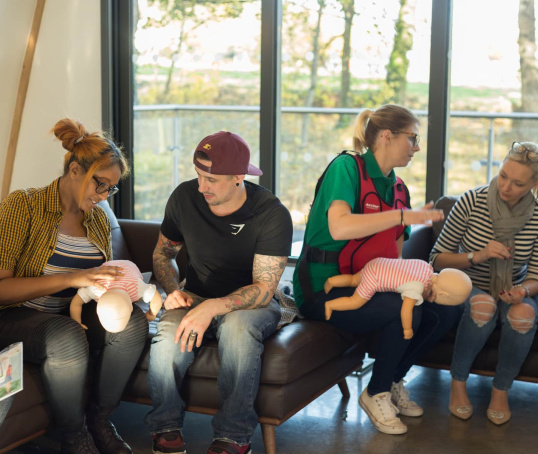Whatever your reasons for stopping or reducing breastfeeding, it can be an emotional and confusing time. If you're considering reducing or stopping breastfeeding your baby or child, here are some tips that might help.
It's important to make the decision that's right for you and your family. Some people regret not getting better support before making the decision (ABM, no date).
Call our NCT Breastfeeding Counsellors on 0300 330 0700, from 8am to midnight every day of the year, to talk about what's best for you. Knowing how to stop or reduce safely will make the change easier. Completely stopping breastfeeding can take from a few weeks to several months (NHS, 2023).
Reducing or stopping breastfeeding: a baby under one
Whatever your plans, you may find it easiest to gradually cut down by replacing one feed at a time. Stopping breastfeeding suddenly can lead to breasts becoming uncomfortably full or mastitis (NHS, 2023).
Stopping can be difficult emotionally for both parents and their baby, possibly causing or worsening depression (La Leche League GB, 2017). Breastfeeding also soothes babies and provides comfort as well as food, so it's easier for your baby to cut down over time.
If you are thinking about moving to mixed or combination feeding, from fully breastfeeding, it's best to do this after about 6-8 weeks when the breastmilk supply is fully established. This will prevent the supply dropping more than you want (NHS, 2023).
- Begin by replacing one of your baby's feeds (whichever one you prefer) with formula. This could be in a bottle if they're under six months old, or a cup or beaker if they're older than six months (NHS, 2023).
- It can take 5-7 days for the milk supply to reduce. Wait until the breasts no longer feel full around the time of the dropped feed before dropping another and replacing it with infant formula. In the meantime, the breastfeeding mother or person might like to use breast pads to catch any leaking milk.
- If your baby is under one, even if they are eating solids, they still need breastmilk or formula as their main drink. Infant formula is the only suitable alternative milk to breastmilk at this age (NHS, 2022). Our NCT Introducing Solid Foods workshops give you the information you need to start your baby on solid food.
Reducing or stopping breastfeeding: a baby over one
After a baby turns one and is eating a variety of food and drinks, you don't need to replace breastfeeds with formula (NHS, 2023). You can read about which drinks and cups are suitable for young teeth.
Stopping breastfeeding an older child can be an emotional experience for everyone. Moving at your own pace and providing extra cuddles, support and distractions for your baby is likely to help.
Tips to reduce breastfeeding an older child
You might find the following tips help:
- Don't offer breastfeeds, but don't refuse if your baby or child wants one.
- Change your routine, for example by not sitting in the chair where you'd normally breastfeed.
- Meet their need for closeness with lots of special time together. Give them your full attention so they feel comforted and safe.
- Develop new associations – rather than feeding them to sleep, introduce a story, song or music to get them ready for bed instead.
- Distract them with other activities at the time they'd normally breastfeed, such as going to the park or playing a game.
- Gently shorten the length of time they feed.
- Offer a snack at about the time they'd normally feed, or before or after a shorter feed.
- If there's another adult around, get them to help with distractions.
(ABM, No date; La Leche League GB, 2016).
Can you take medicine while breastfeeding?
Breastfeeding is still possible when the parent is taking some medicines (The Breastfeeding Network, No date). Look at the Drugs in Breastmilk factsheets or contact the Drugs in Breastmilk service to check your medication.
Can you go back to paid work while breastfeeding?
Breastfeeding women and parents also have rights under UK law regarding the workplace. Read our article on breastfeeding and returning to work.
You can call our infant feeding support line every day from 8am to midnight on 0300 330 0700 to talk to an NCT Breastfeeding Counsellor. You might also find our Introducing Solid Foods workshops and New Baby courses useful for learning more about the changing needs of your growing baby.
Further information
Our NCT Infant Feeding Line offers practical and emotional support with feeding your baby and general enquiries for parents, members and volunteers: 0300 330 0700.
We also offer New Baby courses which are a great way for new parents to feel more confident.
Make friends with other parents-to-be and new parents in your local area and see what NCT activities are happening nearby.
ABM. (No date) Questions mums ask about stopping breastfeeding. Available at: https://abm.me.uk/breastfeeding-information/stopping-breastfeeding/ [23 Jul 24]
La Leche League GB. (2016) Thinking of weaning. Available at: https://www.laleche.org.uk/thinking-of-weaning/ [23 Jul 24]
La Leche League GB. (2017) When breastfeeding ends suddenly. Available from: https://www.laleche.org.uk/breastfeeding-ends-suddenly/ [23 Jul 24]
NHS (2022) Drinks and cups for babies and young children. https://www.nhs.uk/conditions/baby/weaning-and-feeding/drinks-and-cups-for-babies-and-young-children/ [23 Jul 24]
NHS (2023) How to stop breastfeeding. Available from: https://www.nhs.uk/conditions/baby/breastfeeding-and-bottle-feeding/breastfeeding/how-to-stop/ [23 Jul 24]
The Breastfeeding Network (No date) Drugs in breastmilk factsheets. https://www.breastfeedingnetwork.org.uk/drugs-factsheets/ [30 Jul 24]







